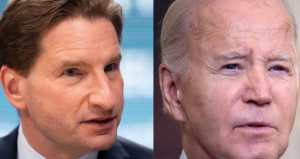Democratic Representative Dean Phillips of Minnesota, who is vying for the 2024 Democratic presidential nomination against President Joe Biden, is drawing attention to what he perceives as Biden’s declining condition over time.

Phillips, in previous remarks reported by various sources, has stated, “I’m not observing cognitive decline. Of course, we’re seeing physical and communication decline.”
In a recent tweet, Phillips asserted that he faces criticism for candidly addressing what he sees as a significant issue: Biden’s apparent decline. He expressed admiration for the President, highlighting his past support and personal interactions, but criticized those who ignore or downplay Biden’s condition. Phillips accused such individuals of leading both the nation and Biden toward disaster while being fully aware of the situation.
Illustrating his concerns, Phillips shared clips of Biden, one of which showed Biden referencing a conversation with former French President François Mitterrand at a G7 meeting. However, Mitterrand passed away in 1996, and Emmanuel Macron has held the presidency of France since 2017.
Phillips further urged people to contemplate Biden’s potential condition five years into the future. He expressed unease over Biden’s decision to run for president again in 2024, contrasting it with Biden’s choice not to run in 2016. Phillips stressed the importance of honesty in addressing Biden’s condition, citing a comparison between Biden’s demeanor at the 2016 convention and his current state.
At 79, Biden is already the oldest president in U.S. history. If re-elected for a second term in 2024, he would be 86 by the end of that term, raising concerns about his ability to fulfill the demanding duties of the presidency given his advancing age.
Phillips’ remarks underscore growing concerns within the Democratic Party regarding Biden’s fitness for office. While many admire Biden’s long career in public service, there is a recognition of the challenges posed by his age and potential cognitive decline. These concerns have prompted candid discussions within political circles about the future leadership of the Democratic Party and the nation as a whole.
